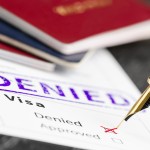The list of foreigners still waiting for Bulgarian citizenship—and passports—is longer than 51,000, and their requests, dating as far back as four to five years, have not even been considered.
In that time, the Ministry of Justice has considered another 8,204 requests and rejected half, mainly because candidates lied about their Bulgarian origins or presented false supporting documents.
The minister in charge of such matters, Bojidar Dimitrov, who pointed out persistent and growing problems with fraudulent applications, was asked who could easily get a Bulgarian passport.
His reply was quick: “Ask Kujovic; he has a passport.”
Budimir Kujovic, according to the Ministry of the Interior, is a main figure in the Balkan underworld, a Serbian citizen who has been named in drug investigations in several Bulgarian towns. He registered his first company—which turned out to be manufacturing amphetamines—in 1997, using Serbian and Slovenian passports. After a series of arrests and incidents involving his properties, culminating with his arrest on drug charges in 2002, he was extradited from Bulgaria in 2005 and banned from the country for 10 years.
The next year, he got an identification card and passport—from Bulgaria.
Signals for Re-Examination
Although the Kujovic affair led to the resignation of the Chief Secretary of the Ministry of the Interior, Ilia Iliev, who had authorized issuing the passport, Kujovic’s is just one example of how criminals and those with connections get passports easily, while ordinary people wait for years and face skepticism about their reasons for wanting to move to or visit Bulgaria.
Plamen Pavlov, the former president of the Agency of Bulgarians Abroad, said there are plenty of signals that call for examination of the procedures and changes.
“I am very disturbed...for the corruption chain… for granting Bulgarian passports,” Pavlov said. He said the way documents are granted must be examined, “because the Bulgarian image is being destroyed and a despicable trade environment has resulted.” He said he has worked with Dimitrov and the new president of his former agency, Raina Mandjurova, and knows they take strong measures when necessary.
But changing things in Bulgaria will be difficult, according to figures kept by the country. The desire for Bulgarian citizenship has strengthened with the admission of Bulgaria to the EU and its Schengen visa system that allows any citizen of the EU to travel freely to other countries in the union.
Fraud Biggest Rejection Cause
Nevertheless, of all the reasons for rejection, false documents rank highest. Rejection on the grounds of a candidate’s presenting a threat to social order or to national security is rare, according to the official statistics of the Ministry of Justice.
But rejections have an effect, said a spokesman in the press office of the Ministry. In recent years, requests for passports have decreased, because of many rejections. The Ministry of Justice rejected just 824 of 22,129 in 2005, while in 2008 it rejected 2,922 of 12,870 requests.
But candidates must wait years to find out whether they will get a Bulgarian passport or not, even though the law stipulates a three-months waiting period and one year for naturalization.
One result, said Dimitrov, is that “In Moldova and Macedonia, there are firms that offer, for money, to get Bulgarian citizenship for people in three months.”
Dimitrov’s solution to this persistent and growing problem is what he considers simple—Give a ruling on Bulgarian citizenship in a period between three and six months.
He said there should be an option, for those who cannot come to Bulgaria to apply, to give their requests to the Bulgarian embassies, and not to use mediators, who, he said, are part of the corruption chain.
“We should stop thinking that if the Bulgarian citizenship is given mores easily in our country, criminals would enter,” he said. “The criminals just buy passports and they don’t wait for years like the ordinary people.”
--Stanimir Vaglenov, Bulgarian Investigative Journalism Center


